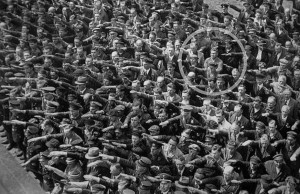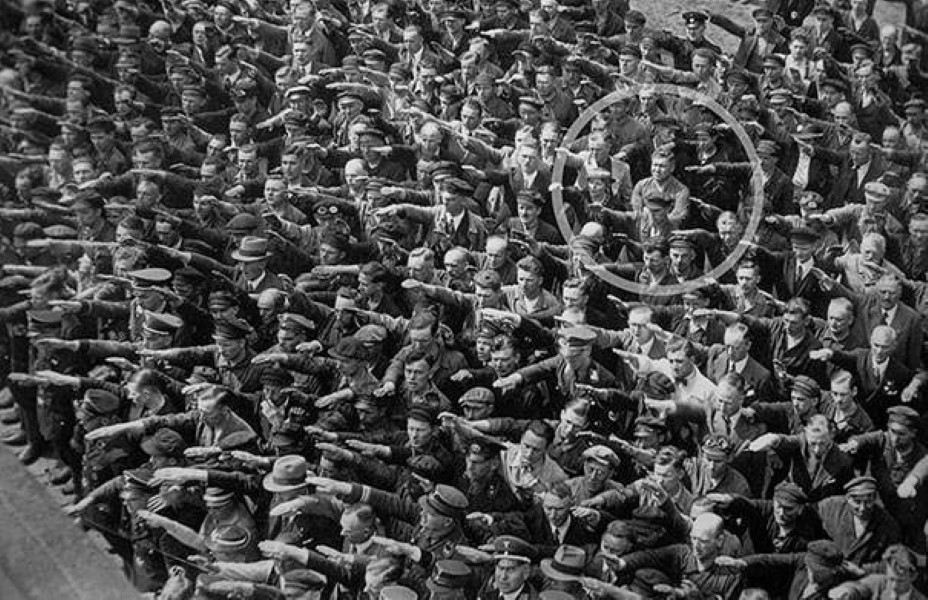One of the great threats that bedevil black Greek-letter organizations (BGLOs)—not simply in the context of hazing but more generally as well—is blind allegiance. Blind allegiance is a concept typically studied in the context of patriotism or group identification that’s characterized by an unquestioning positive regard toward a particular group that causes a person to defend the group even when its actions or morals are misguided. In the context of national identity, for example, blind patriotism is defined as, “a rigid and inflexible attachment to a country, characterized by unquestioning positive evaluation, staunch allegiance, and intolerance of criticism.” This definition is juxtaposed to constructive patriotism—”an attachment to country characterized by ‘critical loyalty’, questioning and criticism of current group practices that are driven by a desire for positive change.”

A lone dissenter risks his life by refusing to give Hitler the Nazi salute during The Third Reich’s rule.
Now, how might this work within BGLOs? Take, for example, the issue of hazing. An easy out for BGLOs is to focus all of their blame on collegiate members and maybe some on alumni for telling war stories or providing time and place for pledge sessions—i.e., sets. In doing so, it also places the ultimate point at which change can and must take place with those members. After all, hazing will stop when hazers stop hazing, right? Suggesting such is similar to saying, “crime will stop when criminals stop committing crime.” It’s fundamentally true, but it fails to take into consideration the individual, interpersonal, organizational, cultural, and societal factors that undergird and propel crime. Similarly, a failure to contemplate and identify the organizational dynamics, among other factors, at play within BGLOs that help propel and amplify hazing, and other issues, doesn’t allow for an honest debate and a finding of a full range of solutions. The challenge is that many BGLO members may find that other members’ questioning their, respective, organization—its operations, policies, practices, procedures—reflects a sign of hostility, lack of affection, or pessimism. Quite the contrary, as the late United States Senator J. William Fulbright noted:
To criticize one’s country is to do it a service and pay it a compliment. It is a service because it may spur the country to do better than it is doing; it is a compliment because it evidences a belief that the country can do better than it is doing. “This,” said Albert Camus in one of his Letters to a German Friend, is “what separated us from you; we made demands. You were satisfied to serve the power of your nation and we dreamed of giving ours her truth…
In a democracy dissent is an act of faith. Like medicine, the test of its value is not its taste but its effects, not how it makes people feel at the moment, but how it inspires them to act thereafter. Criticism may embarrass the country’s leaders in the short run but strengthen their hand in the long run; it may destroy a consensus on policy while expressing a consensus of values. Woodrow Wilson once said that there was “such a thing as being too proud to fight;” there is also, or ought to be, such a thing as being too confident to conform, too strong to be silent in the face of apparent error. Criticism, in short, is more than a right; it is an act of patriotism, a higher form of patriotism, I believe, than the familiar rituals of national adulation….
The discharge of that most important duty is handicapped in America by an unworthy tendency to fear serious criticism of our government. In the abstract we celebrate freedom of opinion as a vital part of our patriotic liturgy. It is only when some Americans exercise the right that other Americans are shocked. No one of course ever criticizes the right of dissent; it is always this particular instance of it or its exercise under these particular circumstances or at this particular time that throws people into a blue funk….
Indeed, as research shows, the ability to criticize that entity one loves is not only predictive of critical thinking skills and is reciprocally related to civic engagement within that entity. That is to say, the more a person participates in their government, for example, the more they’ll think critically and see room for improvement for the country. These findings are in line with Robert Putnam’s theory of social capital, which states that developing knowledge of politics and society’s challenges leads to increased love and increased constructive criticism for the functioning of society.
Within BGLOs, their ability to identify challenges and adequately address them in the decades to come will necessitate a dissenting body of members within their ranks. Conformity and hewing to traditional conventions, doctrines, and ideas will be the ruin of these organizations.


Dr. Parks,
Thank you for your thoughts. I am curious if you think this approach to hazing is specific to BGLOs, or if it may also apply to other Greek-lettered organizations.
Great piece, Bro Parks. Is this the preface/opening to a longer analysis, by chance? I am a long-time aficionado of your analysis of Afro-American Greek organization culture, including your proposed remedies to various deep quandaries identified within the organizations’ systems & processes.
Thanks . . .